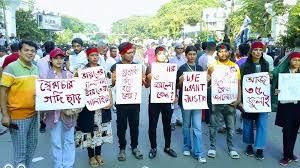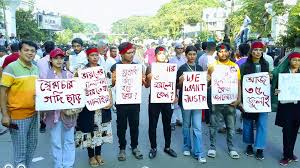
As Bangladesh approaches its next general elections, the call for free and fair electoral processes has grown louder. Human rights activists, both within the country and internationally, have voiced concerns about the potential for electoral malpractice and the need for genuine democratic practices. This article explores the current political landscape in Bangladesh, the demands for electoral reform, and the broader implications for democracy and human rights in the region.
Table of Contents
Background on Bangladesh’s Political Landscape
Historical Context:
- Independence and Early Years: Since gaining independence from Pakistan in 1971, Bangladesh has experienced a tumultuous political history characterized by military coups, political assassinations, and a struggle for democratic governance.
- Political Parties: The two dominant political parties in Bangladesh are the Awami League (AL) and the Bangladesh Nationalist Party (BNP). Both parties have alternated in power, with the AL currently holding a majority under Prime Minister Sheikh Hasina.
Recent Political Climate:
- Election Controversies: The 2018 general elections were marred by allegations of voter intimidation, violence, and irregularities. The opposition claimed widespread rigging, leading to concerns about the legitimacy of the results.
- Human Rights Concerns: Reports of human rights abuses, including crackdowns on dissent, restrictions on media freedom, and arbitrary arrests of opposition members, have raised alarms among international observers and human rights organizations.
The Call for Free and Fair Elections
Human Rights Activists’ Demands:
- Transparent Electoral Process: Activists are calling for an independent and transparent electoral process. This includes a neutral election commission, unbiased media coverage, and the prevention of voter intimidation and violence.
- International Oversight: There is a demand for international observers to monitor the elections. This is seen as crucial for ensuring accountability and transparency, given past allegations of electoral fraud.
- Protection of Civil Liberties: Ensuring the protection of freedom of speech, assembly, and press is essential for a free and fair election. Activists emphasize the need for the government to uphold these rights and allow for a healthy democratic discourse.
Key Figures and Organizations:
- Prominent Activists: Notable human rights activists, such as Sultana Kamal and Adilur Rahman Khan, have been vocal in advocating for electoral reforms. They have highlighted the importance of a fair electoral process for the legitimacy of the government and the protection of human rights.
- Human Rights Organizations: Organizations like Human Rights Watch (HRW) and Amnesty International have issued statements urging the Bangladeshi government to ensure free and fair elections. They have documented instances of rights violations and called for international attention to the electoral process.
Government’s Response
Official Stance:
- Assurances of Fairness: The Bangladeshi government has assured the public and international community of its commitment to holding free and fair elections. Officials have stated that measures are being taken to ensure transparency and prevent irregularities.
- Criticism of Opposition: The government has often criticized the opposition for allegedly trying to destabilize the electoral process. It has accused opposition parties of spreading false information and engaging in activities aimed at undermining democracy.
Actions Taken:
- Election Commission Reforms: The government has announced several reforms aimed at strengthening the Election Commission’s independence. However, critics argue that these measures are insufficient and do not address the root issues of bias and lack of accountability.
- Security Measures: Increased security measures have been promised to prevent violence and ensure voter safety. This includes deploying law enforcement personnel to maintain order during the election period. International Reactions
Global Concerns:
- Statements from Foreign Governments: Several foreign governments, including the United States and members of the European Union, have expressed concerns about the electoral process in Bangladesh. They have called for free, fair, and inclusive elections and emphasized the importance of upholding democratic values.
- UN Involvement: The United Nations has also been involved, with UN officials urging the Bangladeshi government to ensure that the elections are conducted in a transparent and fair manner. They have offered technical assistance and support for electoral reforms.
Potential Consequences:
- Diplomatic Relations: The nature of the upcoming elections could impact Bangladesh’s diplomatic relations, particularly with Western nations. Free and fair elections are seen as a litmus test for the country’s commitment to democratic principles and human rights.
- Foreign Aid and Investments: Bangladesh’s political stability and democratic practices are crucial for attracting foreign aid and investments. Concerns about electoral integrity could lead to a reevaluation of economic partnerships and aid commitments.
Strengthening Democratic Institutions:
- Long-term Reforms: Beyond the immediate electoral concerns, there is a need for long-term reforms to strengthen Bangladesh’s democratic institutions. This includes judiciary independence, legislative oversight, and robust civil society engagement.
- Empowering Civil Society: Supporting civil society organizations and human rights defenders is essential for fostering a culture of accountability and transparency. These groups play a crucial role in advocating for democratic practices and holding the government accountable.
Human Rights Protections:
- Combating Abuses: Addressing human rights abuses, including extrajudicial killings, enforced disappearances, and restrictions on freedoms, is critical for building trust in the democratic process. Ensuring justice for victims and preventing future abuses must be a priority.
- Legal Frameworks: Strengthening legal frameworks to protect human rights and ensure the rule of law is vital. This includes reforming laws that restrict freedoms and ensuring that law enforcement agencies operate within the bounds of the law. Conclusion
The call for free and fair elections in Bangladesh is a crucial step toward strengthening democracy and protecting human rights in the country. As the nation prepares for its next general elections, the voices of human rights activists and the demands for electoral reform must be heeded. Ensuring a transparent and inclusive electoral process is not only essential for the legitimacy of the government but also for the long-term stability and development of Bangladesh. The international community, civil society, and the government must work together to create an environment where every citizen can exercise their democratic rights freely and without fear.








